- Home
- Douglas E. Richards
MindWar (Nick Hall Book 3) Page 5
MindWar (Nick Hall Book 3) Read online
Page 5
Girdler was the head of THT. He had originally wanted to call it the Trojan Taskforce, since the deception he had orchestrated was inspired by the legendary Trojan Horse maneuver, which he considered to be the greatest example of the power of a PsyOps operation in history.
Beware of generals bearing implants.
But the team had rejected the name like a bad oyster. Trojan Taskforce was a bit too on the nose, and suggested the new agency was responsible for marketing condoms, or was a secret society of athletic boosters from the University of Southern California. The team finally compromised on the name THT, short for Trojan Horse Taskforce, but only after making the general promise to never reveal what these initials really stood for.
THT’s mission was three-fold, with each of the three objectives being nearly unprecedented in importance. First, Colonel Mike Campbell would lead the effort to sort through the enormous volume of data coming from the implants buried in the brains of scores of unaware enemies. He would then determine which intelligence gleaned from this activity would be passed on to which agency, so that America’s interests were furthered and threats to national security were stopped, without these agencies learning how this intel had been generated.
Second, Alex Altschuler would be responsible for safeguarding the BrainWeb technology. Altschuler had allowed himself to be thought dead, turning his back on billions of dollars so that the world would believe the secret to BrainWeb had been lost with him, temporarily halting its rollout.
If BrainWeb were commercialized it would surely set records for speed of adoption. If a single bad actor could hack into these devices, he could subvert technology imbedded in hundreds of millions of brains around the globe for purposes of his own. Girdler’s modifications to the implant sets now in Victor’s hands were but one example of the dangers of releasing BrainWeb without first ensuring it was absolutely inviolate.
So Altschuler would devote his genius to solving quantum encryption, a process that would take advantage of the fundamental laws of the universe to ensure the devices were unhackable. Right now, he was confident that the thought-translation software could not be reverse engineered, but this wouldn’t necessarily prevent clever hackers from adding to the software, as Girdler had managed, changing the device’s functionality and the way it interacted with the Web.
Finally, Nick Hall and his fiancée, Megan Emerson, would lead efforts to find a way to block Hall’s mind-reading abilities. Hall was involved, of course, because he was the only man alive known to be able to read minds, but Megan had an important role as well, since she was a rarity, someone Hall could not read.
This work was critical, because other individuals or countries would eventually discover the secret to ESP. When this happened the world would be at their mercy, with individuals helpless to prevent their most private thoughts from being violated. The consequences would be truly disastrous.
And if the secret became readily accessible to everyone, the consequences were likely to be even worse. Families, workmates, and other groups in society had enough trouble getting along when every cruel and selfish thought, every scheme, every sexual fantasy, was safely hidden away.
But when the dam burst and no thought, no matter how ugly, remained private, society would tear itself to pieces. Only if a way were found to restore the order that nature had intended, restore private thoughts to privacy, could these catastrophes be avoided.
But Hall had a more selfish reason for wanting the antidote to mind reading. It was a burden, a nightmare. The white noise had been very difficult to learn to tune out, and no one could be comfortable around a mind reader. And he was constantly exposed to remembered images that were repulsive, to sexual depravities that defied even his own fertile imagination, and to thoughts so hideous they made Medusa look like a supermodel.
“You ready, Nick?” said Captain Floyd Briarwood from the driver’s seat of the Yukon, breaking a long silence.
Hall swallowed hard. “It’s my party,” he said with a rueful smile, “so I guess I have to be, don’t I?”
Briarwood was in charge of THT security, which included protecting the only two members of the team who were truly indispensable: Nick Hall and Alex Altschuler. They also stood at the ready to become Hall’s personal commando force if a mission of paramount importance did arise.
The captain and eleven other special forces commandos had been scrambled to LA to assist Hall when the Cosmopolitan Theater had been seized by a group of Jihadi terrorists during the worldwide broadcast of the Academy Awards ceremony. Given that Hall and this team were the only hope of survival for hundreds of international movie stars and thousands of others attending the ceremony, Hall had been forced to reveal his ESP to them.
The skills of these men were unsurpassed, and not only did they know of Hall’s ability to read minds, they now trusted him enough to follow any order he gave them without a moment’s hesitation. In addition, Hall had developed a camaraderie with this group and had earned their respect. Reassigning them to THT made a ton of sense and kept the inner circle of people in the know as tight as possible.
Megan Emerson was seated next to the man she loved in the middle section of the Yukon, and squeezed his hand in a show of support. Three other members of the security team rode with them, a lieutenant named Chris Guest, and two sergeants, Joey Plaskett and Kevin Wellman.
The car pulled up to a large, flat building that had been hastily built at the behest of the president to Nick Hall’s specifications, one that was strictly off-limits to everyone at the base, including its commander. The forbidden structure looked like a windowless concrete barracks from the outside. Inside, it was a honeycomb of almost fifty separate self-contained rooms, each with one-way mirrors along their back sides, which could only be viewed from hidden corridors built solely for Hall’s use.
The mind reader took a deep breath and left the car, surrounded by his entourage. He had explained to his security force that he didn’t need them to watch his back while he was working, but they continued to ignore him. Not only was he safely within the gates of a military installation, but it was impossible to sneak up on a mind reader with intent to do him harm. While his conscious mind couldn’t possibly track and digest the sea of thoughts coming from multiple sources, his subconscious, behind the scenes, did just this, alerting him only when it identified something he urgently needed to know, a phenomenon researchers called the Cocktail Party Effect.
Megan Emerson had come along for moral support, as she had done each time they had repeated this exercise, once a month for the past five. The facility had been built at the westernmost corner of the sprawling base to keep Hall a full seven miles away from the bulk of the base’s personnel. Even so, there was no avoiding the scattering of civilians who drove near enough the base to be within Hall’s psionic range, which dropped off significantly at a distance of five to six miles. Megan couldn’t read minds, but she was well aware that Hall would be bombarded by enough signals to be under a low level of constant psychic stress.
“Sorry, Nick,” she thought at him telepathically. “I know how much this sucks for you.”
“I’ll live,” he broadcast back stoically. They had kept their telepathy an even bigger secret than Hall’s mind-reading abilities, since this ability had saved them on more than one occasion and could well do so again.
“If it gets too much to bear,” she advised telepathically, “just start picturing me naked.”
Hall laughed, which to those around him looked unprovoked, since they had no idea the loving couple they were escorting were in communication.
“Start picturing you naked?” he broadcast back with a broad grin, emphasizing the word start. “What makes you think I’ve ever stopped?” he added as they walked through a door that Sergeant Wellman held open for them.
Now it was Megan’s turn to laugh, which made their four escorts look around to see if there was something humorous happening nearby that they had failed to notice.
“Great,” sh
e replied. “And this from a man who doesn’t even need to use imagination to picture me naked. Who can access actual footage of our past sexual encounters at any time.”
“Yeah, but that would be a serious mistake right now,” broadcast Hall, his telepathic communication managing to convey his amusement. “I have an important job to do, and I need all of my blood flowing to my brain, if you know what I mean.”
Megan gritted her teeth so she wouldn’t laugh once again. No need to make their guards, who were also now friends, think they had both gone mad.
Humor was Hall’s defense mechanism, used as much when he was under stress as when he was relaxed and happy. And this mission could not be more serious, or more mentally taxing. Although Hall had other primary responsibilities on the team, his abilities were too useful, their use in fighting terror too irresistible, to pass up.
In six hours he could root out more plots and terror networks than the entire Department of Homeland Security could in six years.
And these six hours were about to begin.
8
DHS maintained a list of their top terror suspects in America. Each month for almost half a year now, like clockwork, select DHS personnel had been assigned to round up the top ninety-nine names on this list, and take them on a pilgrimage to the odd structure at the westernmost corner of Hill Air Force Base for questioning. Each of the ninety-nine was escorted there separately from all corners of the country and arrived on the same day.
Thirty-three would be deposited at the interrogation center every two hours, but would be cleverly staggered and would come through several different entrances built for this purpose, so none could see any others who were involved. Hall had chosen this number of suspects himself, pushing the limits of what he could handle in a single day.
Even those who were American citizens could be held for up to seventy-two hours without charges before DHS risked even the slightest chance of running afoul of the law, but twenty-four hours wouldn’t raise a single eyebrow anywhere, especially since they were always treated exceptionally well.
Each man or woman was placed in a room with a comfortable chair and a television to keep them entertained during prolonged waiting periods, and a generous selection of quality food and beverages. The rooms were meticulously clean, warmly lighted, and smelled of vanilla. Vanilla.
Hall had insisted his job was made easier when they were relaxed and at ease.
Once Hall was finished with each suspect, a member of DHS would be alerted to come in and ask a few cursory questions, just to legitimize the episode in the minds of the suspects, although these personnel had no idea that Hall existed or was the real purpose of the exercise. The questions were generic and delivered in a non-hostile manner. “Do you know of any imminent attacks on the US? Are you involved in a terrorist plot?” and that sort of thing.
Some of the more affluent suspects who were American citizens insisted on bringing attorneys along, but given their gentle treatment and the friendly, even trivial, interrogations, the attorneys had no reason to complain and largely did nothing.
That was it. Suspects would sit in a relatively comfortable room, eating and watching TV, until they were asked the few tightly controlled questions that DHS personnel had been authorized to ask—despite the strenuous and repeated objections by these personnel that the questions were useless. After this, suspects were returned to their homes on the government’s nickel while members of DHS apologized for the inconvenience.
The DHS agents involved found the entire process a joke. Maddening. Humiliating. They were acting under orders issued far above their pay grades, but had no idea why they were engaged in such a pointless and moronic exercise, which succeeded only in tipping off suspects that they were high up on the terror list while gaining the Department of Homeland Security nothing in return.
The process was so idiotic, even for the government, that most agents felt certain that something else had to be involved. Had to be. Something they were missing.
Some conjectured that a Black laboratory had installed technology in these rooms that could obtain the suspect’s DNA, fingerprints, and retinograms without their knowledge or permission. Others thought the rooms must be fitted with advanced cameras, tied to specialized computers, which could extract ultra-accurate facial recognition data and tag the suspects in such a way that they could be picked out at any time, even from space.
While there had once been speculation in some circles about a man named Nick Hall who could read minds, he was once again convincingly dead, and no sane agent would possibly conjecture that he was the power behind this.
But behind this he was. And at the moment, he was bracing himself for a mental marathon, dreading the deep dive he was about to take into an ocean-sized cesspool of hatred and brutality.
He took a deep breath as the first group of thirty-three terror suspects were brought in, right on schedule, and deposited in four different blocks of rooms, once again cleverly staggered and positioned so they didn’t run into anyone else about to be interrogated. Nick Hall entered the corridor behind the first block of rooms, totally alone, and sat in front of the one-way mirror installed in room number one. Identical chairs had been placed behind the one-way mirrors of every room for Hall’s convenience.
He studied the man through the transparent side of the large mirror. He didn’t need line of sight to do his job, but it was a big help. He could have been a mile away and still managed to sort through the barrage of thoughts he was receiving to find each subject in turn, but this would have been far more mentally taxing.
Hall knew he had to average just under four minutes with each subject to complete the job in the six hours he had allotted. Experience had shown him that if he pushed on much beyond six hours he would be all but useless for days afterward, his brain suffering the equivalent of the world’s worst hangover, his gray matter barely functioning and forcing Hall to do little else but sleep it off.
He could dispense with some of the ninety-nine subjects very quickly, and a few in each batch even turned out to be mistakes, being pro-West in their views, even if they pretended otherwise for various reasons, including fear for their lives. But some required a full ten or fifteen minutes of meticulous probing for him to get all he needed.
The first mind Hall entered belonged to an American, Muhammad Adib, so he had no need to engage his implants to pick up on the thoughts he received and translate for him, or practice the Persian and Arabic he had been busily learning. He spun through the man’s brain like a cartoon Tasmanian devil, racing through its metaphorical table of contents to find chapters of interest.
Adib was heavily involved in the financing of Jihad. He ran a dead drop to deliver money to sleepers, and funneled other monies through dummy accounts into the hands of terrorist leaders around the world. Hall quickly read the particulars—people involved, verbal codes to be used to verify identities, account passwords, routing information, procedures, dummy corporations, and more—and instantly relayed this information to a secure website filed under the man’s name.
Within minutes Hall had drained Adib of every last atom of useful information, sucking intel out of the man’s brain so completely it was a wonder it didn’t collapse down to the size of a pea.
Hall noted with great interest that Adib had also siphoned off several million dollars for his own use, which he had kept well hidden—at least from everyone but a mind reader. Hall flagged this with his opinion that this knowledge could be successfully used to blackmail Adib into becoming a DHS asset.
In every batch there seemed to be a few who had stolen funds from the caliphate, or had engaged in thoughts or behavior so forbidden for Muslim extremists—especially homosexuality—that they could be easily blackmailed into working as spies for America.
The mind reader moved one chair down and repeated this exercise with the second prisoner. Then the third.
“How’s it going in there, Nick?” broadcast Megan Emerson as he rose to make his way to the fo
urth chair.
“It hasn’t even been half an hour,” he responded.
“True. But since my only job is to provide you with occasional refreshments and moral support, it seems a lot longer. Besides, I wouldn’t want you to forget I was here.”
“Never,” replied Hall, knowing she was with his security team just outside the hallway, probably reading a novel on her tablet computer. He also knew she enjoyed the company of all four of his protectors, so she wasn’t suffering from the wait all that much.
Those few in the know within THT had discussed the ethics of what Hall was now doing at great length. He was the ultimate embodiment of the thought police. He was a wraith, an invader, stealing thoughts from people who had no idea he was there, without their knowledge or consent.
After considerable debate they had decided that if Hall read from a subject’s mind that a crime was being contemplated, this would never be sufficient for further detainment or arrest. Tangible evidence would always be required.
Not only was this the ethically correct choice, it was the practical choice as well. They would need to get other agencies involved to move forward, and how could they make this happen without any proof they could point to? You couldn’t jail a man for fantasizing about murdering his wife. You couldn’t even jail a man who actually did murder his wife, if all the proof you had was Nick Hall’s say-so.
But if Hall were to suggest digging under a particular tree, and you happened to find a murder weapon with the husband’s fingerprints all over it, a conviction could be won. It wouldn’t matter how Hall knew how to guide you. After all, police departments had been using psychics for years. The only difference this time was that the psychic in question wasn’t a fraud.
Hall continued to plow through the first third of the suspects, transmitting what he read directly to websites partitioned with their names in each case, stopping only to take a bathroom break and to accept a bottle of cold water that Megan shuttled in.

 Oracle
Oracle![[2016] Infinity Born Read online](http://i1.bookreadfree.com/i/03/18/2016_infinity_born_preview.jpg) [2016] Infinity Born
[2016] Infinity Born Infinity Born
Infinity Born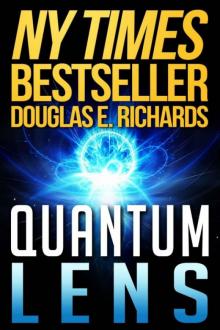 Quantum Lens
Quantum Lens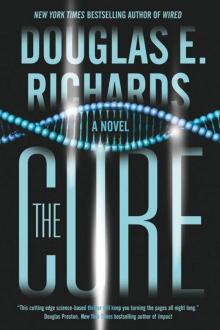 The Cure
The Cure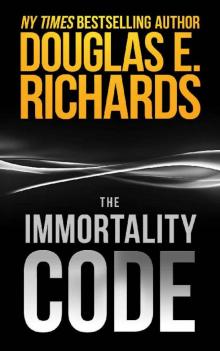 The Immortality Code
The Immortality Code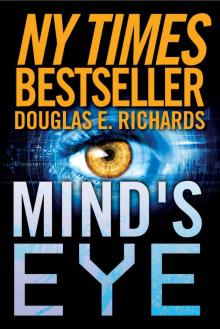 Mind's Eye
Mind's Eye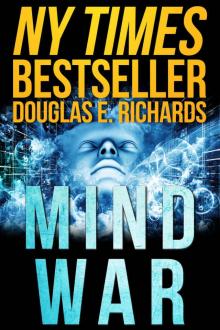 MindWar (Nick Hall Book 3)
MindWar (Nick Hall Book 3)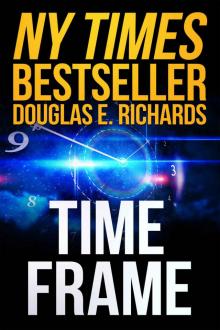 Time Frame (Split Second Book 2)
Time Frame (Split Second Book 2)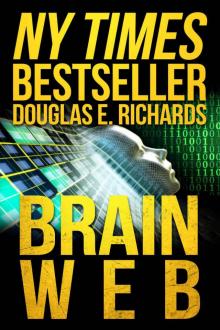 BrainWeb
BrainWeb Wired
Wired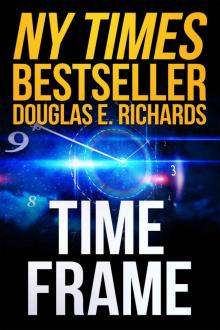 Time Frame
Time Frame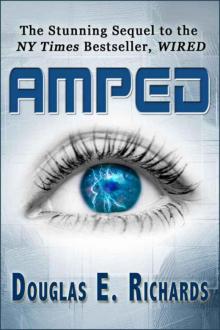 AMPED
AMPED Out of This World
Out of This World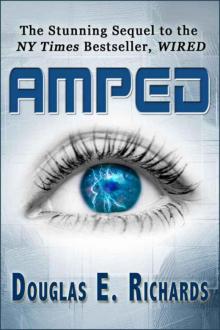 AMPED w-2
AMPED w-2